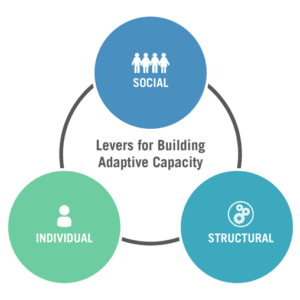Thinking differently about Culture – Part Two
Jun 07, 2021
In Part 1 of this article, we shared frameworks used to explore the potential of a co-evolving organisation. As you consider evolving your organisation, leadership and culture, the following ideas, principles, perspectives and questions may be of interest. These questions and perspectives were generated in a recent Adaptive Cultures community gathering. The conversation explored ways of evolving the adaptive capacity of a number of Australian and Global organisations who are currently grappling with a traditional legacy.
When asked to consider evolution of the organisation from the perspective of a stakeholder group, the following ideas and points of exploration emerged:

Customers
- Customers see the organisation as ONE. How do we enable all people in the organisation to look through this lens rather than focussing on parts (functions, teams, levels etc)?
- Invite customers to help to evolve the organisation through bringing them in and inviting them to point out challenges and opportunities from a customer perspective
- Move from meeting customer needs to meeting their needs AND helping customers to evolve
- Move from commodification of and by customers to the principle of reciprocity
Investors
- Invite investors into the organisation with complete transparency to co-create with us
- Ensure investors have a shared purpose with the organisation
Stakeholders
- Develop more inclusive ways of working, providing radical transparency to stakeholders without being afraid of the outcome
- Who are the voices we don’t hear from?
- How can we include the most disadvantaged in our communities?
Planetary ecosystem
- We all have responsibility to replenish the system
- This perspective provides a sense of urgency to evolve and also bolder thinking and ideas
- Humility to learn from others (for example practises of so-called third world countries) and be aware of and challenge our first world worldview
- We have a responsibility to all stakeholders including our planetary eco-system. What are the ugly truths we need to face?
- Taking a planetary perspective changes the way we consider what we are doing in an organisation
The following insights emerged from the group when considering the three levers for building adaptive capacity:
Individual Evolution
- We need to hold ourselves at our growth edge and continue to question our worldviews and assumptions
- Find non-threatening ways to invite people into their own development
- Do our workplaces constrain our capacity more than we exhibit in our social lives? If we could bring our whole selves to work what could that enable? What are we hiding? How can we enable more authenticity?
Social Evolution (including team members)
- Moving from individual expertise to collective wisdom
- Creating a greater level of attunement so work can be intuitive
- A genuine sense of belonging
- Expanding our sense of team to include customers, investors, community, stakeholders, planetary eco-systems
- What might be the impact of putting the human needs of team members at the centre?
- How do we cater for individual differences within systems?
The power of rituals and ceremonies to enable:
- Reflection
- Seeing our blind spots
- Sharing failures as a way to leverage learnings and opportunities
- Experiment together
- Challenge support and develop
Reframing Culture
One of our practitioners reframed culture as: culture is building capacity to execute on strategy and achieve the organisation’s purpose and aspirations. Many expressed that their organisations did not see the connection between cultural evolution and change or project management. Often when the organisation was asking for more effective ways of managing a project, they were actually asking for cultural evolution.
Perspectives on Leadership
Many of our culture “change” initiatives are shaped by assumptions about leadership and what leadership means. For example, does leader-led mean that we lead through hierarchy or through people who embody leadership qualities? How do our hierarchical mindsets limit accountability? Do people see how they influence culture? Their personal agency?
How would leadership be defined differently in our organisation’s aspirational culture?
How do we help people develop leadership capacity? How do we assess this?
Perspectives on Talent and Recruitment
- Are we asking the right questions in our talent processes?
- Culture fit sustains where we are –what if we hired for cultural provocation?

To imagine a new and better future, we will need to, as David Bohm shares: “shake off the pollution of the ages”. This pollution consists of the limiting worldviews and narratives that propagate ignorance. In our Adaptive Cultures community events, we aim to enable a space and share frameworks that can help us to do this and also to generate collective insight to enable cultural evolution.
If you would like to be a part of this community and an ongoing conversation feel free to join us.
Many of our community have participated in our Practitioner Accreditation Program, the next one begins in February 2022.
Our Adaptive Cultures Community
Our Global Community is an enriching space for culture practitioners to share, learn from, explore and develop emerging practices in support of their clients developing needs. On our community platform we share methods and tools, ask questions, conduct developmental conversations and learn together.
Read the Adaptive
Organisations Whitepaper
Download our Adaptive Organisations Whitepaper and learn how to evolve through change and complexity. To receive a copy, please fill in your details below and a copy will be emailed to you.


